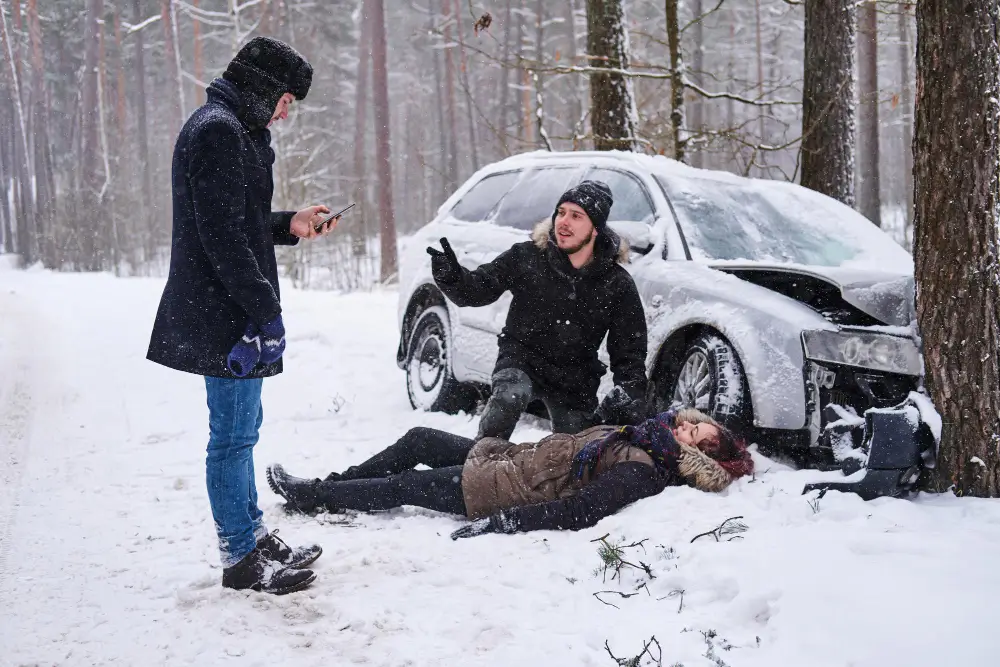When Charlotte drivers think about dangerous driving conditions, winter ice often comes to mind first. But the Queen City presents unique accident hazards in Charlotte throughout all four seasons, not just during those occasional winter freezes. At Top Dogz Towing Company, our team responds to accident recovery situations in every season, and we’ve noticed distinct patterns in the types of incidents that occur as the calendar turns. Call us at (704) 774-8669 if you find yourself needing assistance after encountering any of these seasonal hazards.
The changing seasons in Charlotte bring different challenges to our roadways. From spring’s pollen clouds to summer’s scorching pavement, fall’s slippery leaves to winter’s deceptive black ice, each season carries its own set of risks that smart drivers should recognize. In this article, we’ll explore the specific accident hazards that Charlotte drivers face during each season and provide practical advice to help you stay safe year-round.
Spring Accident Hazards in Charlotte: More Than April Showers
Have you ever noticed how the number of fender-benders seems to increase when spring arrives in Charlotte? There’s more at play than just increased traffic.
Spring in Charlotte brings the notorious “pollenpocalypse” when our cars, roads, and everything else turns yellow-green. This pollen doesn’t just trigger allergies—it creates genuine driving hazards. When pollen accumulates on your windshield, it can combine with morning dew or light rain to create a slurry that severely reduces visibility. What’s more, allergy symptoms like watery eyes, sneezing fits, and fatigue can significantly impair your driving abilities.
While pollen is certainly troublesome, Charlotte’s spring rain presents perhaps the most significant seasonal driving challenge. The sudden downpours characteristic of Carolina springs create immediate hydroplaning risks and dramatically reduced visibility. Heavy spring rains often overwhelm drainage systems, especially in rapidly developing areas of the city.
Spring also marks increased wildlife activity across Mecklenburg County. Deer, raccoons, and other animals become more active, often crossing roadways unexpectedly. According to North Carolina wildlife officials, animal-vehicle collisions increase significantly during spring months, particularly on roads near green spaces like the areas surrounding the Whitewater Center and Mountain Island Lake.
Charlotte’s continuous growth means spring construction season brings its own accident hazards:
- Lane shifts and sudden merges: The I-77 corridor and parts of I-485 frequently see construction that alters familiar driving patterns.
- Loose gravel and uneven surfaces: Resurfacing projects leave temporary road conditions that require reduced speeds.
- Construction vehicle traffic: Large trucks entering and exiting work zones create additional hazards, especially during morning rush hour.
When driving during Charlotte’s spring months, keep your windshield washer fluid full, take allergy medication before driving if you suffer from seasonal allergies, and stay alert for construction zone changes that may have occurred overnight.
Summer Accident Triggers on Charlotte Roads: Heat Brings Its Own Problems
Why do certain types of accidents become more common during Charlotte’s hot summer months? The combination of extreme heat, increased tourism, and changing traffic patterns creates unique accident hazards in Charlotte during summer.
Tire blowouts become significantly more common when summer temperatures regularly exceed 90 degrees. The hot pavement increases the air pressure in your tires while simultaneously softening the rubber, creating perfect conditions for a blowout—especially if your tires are already worn or underinflated. Charlotte’s heat also contributes to more frequent vehicle overheating and brake failures, particularly in older vehicles or those overdue for maintenance.
Summer in Charlotte brings distinctive traffic patterns that increase accident risks:
- Tourist and visitor traffic: Unfamiliar drivers navigating to destinations like the NASCAR Hall of Fame, Carowinds, or the U.S. National Whitewater Center often make unpredictable movements or last-minute turns.
- Increased pedestrian activity: Uptown Charlotte and areas like NoDa and South End see significantly more pedestrians during summer evenings, requiring extra vigilance from drivers.
- Summer storms: Charlotte’s summer thunderstorms often arrive suddenly, creating immediate hydroplaning risks on roads that were dry just minutes earlier.
To reduce your summer driving risks, have your cooling system and air conditioning checked before the season’s peak, maintain proper tire pressure (checking it during cooler morning hours for accuracy), and be especially cautious during sudden summer downpours when oil residue makes freshly-wet roads particularly slippery.
Fall’s Unique Driving Challenges: Leaves, Fog, and Early Darkness
What makes fall driving in Charlotte deceptively dangerous? The season’s beauty masks several serious road hazards.
Fallen leaves may look beautiful, but when they collect on Charlotte’s roadways, they create multiple hazards. Wet leaves can be as slippery as ice, particularly on curving roads through leafy neighborhoods like Myers Park and Dilworth. Even dry leaves present problems by hiding road markings, concealing potholes, and clogging drainage systems that can lead to unexpected pooling water during rain.
Charlotte’s location in a river basin means fall mornings often bring dense fog, particularly in low-lying areas and near water sources. Areas near Mountain Island Lake, Lake Norman, and along the Catawba River can experience visibility reduced to mere feet, especially during the temperature fluctuations common in Carolina autumns.
School zone activity reaches its peak during fall months after summer break ends:
- Changed traffic patterns: Areas around Charlotte’s numerous schools become congestion points during morning drop-off and afternoon pickup times.
- Distracted young pedestrians: Children, especially during the first months of school, may be less attentive when crossing streets or walking near roads.
- Bus stop traffic: Vehicles must stop for school buses loading and unloading children, creating sudden traffic halts that can surprise inattentive drivers.
Fall driving in Charlotte requires extra caution during early morning hours when fog is most likely, complete stops at all school bus signals, and reduced speed when driving on leaf-covered roads, especially after rainfall.
Winter Hazards Beyond Ice: Charlotte’s Overlooked Cold-Weather Risks
Does Charlotte’s mild winter climate mean drivers can relax? Not at all—our winter brings subtle accident hazards that catch many drivers by surprise.
Unlike consistently cold climates, Charlotte’s fluctuating winter temperatures—often swinging above and below freezing within a 24-hour period—create especially dangerous road conditions. These freeze-thaw cycles damage road surfaces, creating potholes that appear seemingly overnight. They also create perfect conditions for black ice, particularly on bridges and in shaded areas that may remain frozen hours after sunny spots have thawed.
Winter in Charlotte means:
- Earlier darkness: Rush hour commutes occur in darkness, reducing visibility and increasing fatigue.
- Holiday traffic congestion: Areas around SouthPark Mall and other shopping centers become accident hotspots during the holiday season.
- Infrequent winter drivers: Many Charlotte residents lack experience driving in winter precipitation, leading to overcorrection and panic braking.
To navigate winter driving safely, allow extra following distance even when roads appear clear, be especially cautious on bridges and overpasses where ice forms first, and keep your headlights on during overcast days to improve both your visibility and others’ ability to see you.
Year-Round Preparation for Charlotte Drivers: Stay Ready for Anything
How can you stay prepared for Charlotte’s ever-changing driving conditions? A seasonal approach to vehicle maintenance and emergency preparedness makes all the difference.
Your vehicle needs different attention as seasons change. Schedule regular maintenance checks that include seasonal focus areas—cooling system before summer, battery and heating system before winter, tire condition before spring and fall road trips. Keep windshield wipers fresh, as they deteriorate quickly in Charlotte’s hot summers and are crucial during spring and fall rain.
Maintain a year-round emergency kit in your vehicle that includes:
- Water bottles and non-perishable snacks
- Flashlight with fresh batteries
- Basic first-aid supplies
- Charging cable for your phone
- Season-appropriate items (sunscreen in summer, ice scraper in winter)
Charlotte’s varied weather patterns mean conditions can change rapidly. Bookmark reliable local weather and traffic resources on your phone, and consider using apps that provide real-time traffic updates specific to your regular routes.
Staying Safe Through All Seasons in Charlotte
Charlotte’s distinct seasons each bring their own set of driving challenges. By understanding the specific accident hazards in Charlotte throughout the year, you can adjust your driving habits and preparation accordingly. Remember that safe driving isn’t just about handling your vehicle in bad conditions—it’s about recognizing potential hazards before they become emergencies.
At Top Dogz Towing Company, we’re committed to helping Charlotte drivers stay safe on the road year-round. If you do find yourself in need of accident recovery services, remember that we’re available 24/7 at (704) 774-8669. Our experienced team understands the unique challenges that each season brings to Charlotte’s roadways, and we’re always ready to help when you need us.
Stay aware, drive prepared, and adjust your habits with the seasons—because in Charlotte, the next driving challenge is often just around the corner or hiding in the next season’s forecast.




